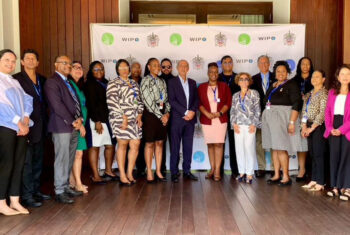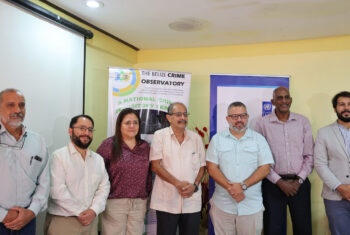September 24, 2020.
Good afternoon Commonwealth Secretary-General Baroness Scotland,
Chair of the Alliance of Small Island States, Ambassador Young,
Excellencies,
Colleagues.
It is a pleasure for me to be here today not least of all because it is not often that I get to be on a high-level panel that is comprised of all women. It is quite refreshing, actually, and would have been practically perfect if the Honourable Mia Mottley would have been able to be present.
Thank you for inviting me to contribute to this critical discussion. The Commonwealth Secretariat for over three decades has led work on the special issues and challenges facing small states. Whether we are referred to as just Small States or as Small Island Developing States hardly matters to most of us. We are countries that are small in population, most of us under 1½ million persons. We are small in land mass. Most of us are islands, not all of us. Our economies are small and open.
Our contribution to climate change is likewise small, but we bear the brunt of its effects: rising seas, the bleaching of our coral reefs, the intense storms that bear down on us, more frequently and with more ferocity these days. What is more, science tells us that what we are experiencing is a foreshadowing of what can come, what will come. So, when we call on major emitters to keep to the Paris commitments, it is because we wish for a better future.
Belize, we like to say, is a bridge between the Caribbean and Central America. We are not an island, but we are home to the largest living barrier reef in the world – a reef wondrous in its beauty but also a vital natural protective barrier against the onslaught of frequent hurricanes. We believe that we have to protect our reef system so that our reef can protect us.
Belize’s economy is somewhat diversified. We export both goods (mainly primary agriculture) and services (mainly tourism). But the economies of our sister nations, surrounded by vast oceans, are even more concentrated. For any us, the most subtle changes in the global economy can have far reaching and almost immediate impacts. For those of us whose economies depend on the North American tourism market, we say in Belize, when the US sneezes, we catch the cold. Prior to the ongoing economic collapse brought on by COVID-19, some of us were still recovering from the impacts of the 2009 financial crisis, especially through extremely high debt burdens as we then sought to stabilize our economies and societies.
Combine this with the effects of regular cyclones and hurricanes. Add the consequences of droughts and rising seas. The impacts we bear from these disasters compound over time. Belize, for instance, is still repaying debts incurred for rebuilding after Hurricanes Keith and Iris in 2000 and 2001, is still repaying debts incurred for rebuilding after eight named storms between 2007 and 2017, including Hurricane Richard which caused significant damage all the way inland in Belmopan, the new capital city which was built as a safe haven after Hurricane Hattie destroyed Belize City in 1961. Just weeks ago, Hurricane Nana, as only a category 1 storm, damaged much of our export crops in the south of our country, damages which must now be added to the costs of the COVID-19 pandemic.
Yet, Belize is not unusual. This is the story of SIDS, and 2020 seems to have dealt all of us an unfair blow. As the pandemic unfolded, SIDS closed their borders, implemented physical distancing and stay at home orders. To save lives, we offered up our economies. Many of our economies collapsed in a matter of weeks. We had to find ways to widen social safety nets, to keep people fed while unemployed, even as we had to find funds to access unbudgeted test kits, ventilators, PPEs, additional hospital beds.
Like other SIDS, Belize has repurposed loans that were meant for development projects and borrowed from our Central Bank for immediate funding early in the crisis. Without the restart of our economy, the reality is that there is not much further that we can go. Our international airport is scheduled for reopening on October 1st, a postponement of our earlier plans. While we were able to keep our COVID-19 numbers low early on, the present situation is vastly different as we have had a very sharp rise in cases in the last two months, largely as a result of movement across our porous borders.
When you plan your recovery based on limited and uncertain access to resources, and measure action based on the actions of others, it is not easy to be optimistic or hopeful. I’m sure many of you have heard other SIDS representatives ask the international community to offer more than kind words. I have done the same repeatedly and most recently in the Financing for Development in the Era of COVID-19 and Beyond process. Truth be told, I sat through many of those meetings asking myself, whither SIDS? In a global financial system that seems focused on maintaining the status quo, where do small, vulnerable economies turn? On whose door must we knock?
For over 30 years, SIDS have asked for a system that allocates assistance not only on the basis of per capita income, but also on the basis of reality on the ground. We need a system that takes into account and responds to the fact that our high debt levels are not an indicator of frivolity but of response to need after disasters of nature and disasters brought on by market failure – these same disasters that increase investment risks and drive up the cost of credit, whether through interest rate increases or rising insurance costs.
And yet, here we are, with little access to affordable assistance, with options that, if eventually negotiated, will offer help years from now when the truth is SIDS need help now. Help of a kind that recognizes our peculiar vulnerabilities; and help that is provided in keeping with the principles of justice: “every man his due”. In 2020, that is all SIDS ask of this system: allow us our due, including not expecting us to continue to pay the greater cost of the climate change brought on by others. We ask this not out of some need to entreat on morals but as a right accorded to all of us.
SIDS need SIDS solutions. We need a SIDS Compact that offers solutions that respond to our vulnerabilities and carves out measures that allot finance to respond to those challenges we did not cause and cannot long abide on our own.
These solutions must include access to liquidity for all SIDS on grant and concessional terms. The Resilience Fund being scoped out by ECLAC hold much potential in this regard and requires serious and urgent attention from our international partners.
Our solutions must also include debt workouts with private creditor participation. This has probably been the most difficult of the topics on which to get any serious conversation going in the “Financing for Development” process. But the truth is, private creditors need to be willing to discuss helping heavily indebted SIDS across this COVID crisis if they want to help themselves back into a situation where our parts of the market can return to investment grade.
In this, it will be important for all to understand that the debts we are taking on to battle COVID must be ring-fenced. These are investments we had to make to protect our citizens and their livelihoods and to do our part to help the global effort to control the spread of COVID. These are debts that we have been forced undertake to address COVID in its both health and socio-economic impacts. Let us treat them like the essential and unavoidable expenses that we had to make, even as our revenue inflows collapsed and find a way to fund them sustainably over the longest possible term, or we will be further eroding the development gains we have made over the last few decades.
Finally, our options must include debt for development and debt for climate swaps. And they must include economic recovery aligned with the Paris Agreement. To sidestep this imperative would be a disservice to all our future generations.
I look forward to the discussions today. I am sure some of these options will be discussed today and I encourage all of us to participate in the discussions with an open mind, for it will take a willingness to find new ways of thinking and doing to successfully address the economic impact of COVID and protect our future.
As I close, I ask my SIDS colleagues, let us remain resolute in pressing for that justice we often call for.
Thank you.


